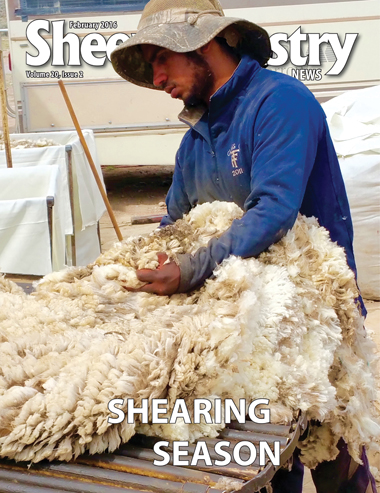
- February 2016
- President’s Notes
- Tips for Shearing Season
- Benny Cox is a Man of Many Hats
- Hiring Extra Farm/Ranch Help
- Sutton Ridge Adds Unique Twist to Shearing Day
- Wisconsin Station Discontinues Dairy Sheep Program
- Market Report
- Obituaries
- KENTWOOL Sponsors Pro Tour Caddies
- Shropshires Offer Starter Flock
- News in Brief
- The Last Word
To View the February 2016 Digital Issue — Click Here

Country of Origin Labeling for Lamb
Burton Pfliger, ASI President
As I have traveled the country this past year, every media interview I did wanted to talk about how the sheep industry retained Country of Origin Labeling for lamb. My response was that sheep producer members of ASI have had a consistent 20-plus year policy supporting the identification of American lamb.
In addition, today’s consumer is always seeking more information about the foods they consume. Today’s buzz words are humanely raised, sustainable, antibiotic free, grass fed and free range. All of these descriptive terms would not be possible if identity preservation was not maintained. So sheep producers believe COOL – as the labeling has been referred to for a decade or longer – fits so well with the whole “know your farmer know your food” movement that is sweeping the consuming public.
The livestock publications are full of articles this winter with pork and beef industry’s bragging or bemoaning the elimination of mandatory labeling for their products in the United States.
You will note the press reports and letters to the editor are specific to beef and pork, as they are aware lamb remains under mandatory labeling requirements. In fact, we’ve followed press reports from our neighbors to the north who are without a doubt unhappy about lamb’s retention of COOL.
“I think the American sheep industry has better lobbying power than we do, maybe. I don’t know,” said Canadian Sheep Federation chair Phil Kolodychuk in a story published in The Western Producer of Canada.
The Canadian Sheep Federation contacted us with their displeasure after the U.S. House of Representatives voted to retain COOL for lamb this spring. By that time, we were well past the appropriate time frame to address lamb labeling.
The Canadian sheep industry’s struggles can be attributed to more than just country of origin labeling, however. They took a major hit when they found BSE cattle in their livestock industry. I believe live lamb prices in Canadian currency collapsed from $1.35 a pound to 55 cents and the feedlots that were basically dedicated to supplying the 100,000 lambs a year shipped to American plants largely went out of business.
It was such an extended time frame to straighten out trade that the Canadians lost their producers and feeders to serve this market to the point that we ship live lambs to Canada these days.
The efforts required to keep COOL in place were monumental and very far out in front of policy development at the national level. This is absolutely due to your individual state trade associations and the American Sheep Industry Association fighting to keep labeling in place for lamb.
COOL has been an issue of contention in other species, but much less so in the sheep industry. In my travels, I have not found a state association meeting that doesn’t strongly support the labeling. I encourage each of you, when promoting your state association dues, to use COOL as a key reason, among many, to highlight with sheep producers why individual memberships to ASI should be supported.
The sheep industry has a long and storied career of spearheading the legislative effort every year to protect wildlife damage management tools and the revenue to implement the programs. ASI brings partners to the effort from every corner of U.S. food production, sportsmen, government and safety concerns. The sheep industry led the effort this past year to reauthorize mandatory price reporting for livestock, as ASI had invested two years in preparing changes and updates to the law for our industry’s benefit. Those changes authorized in the new language should pay big dividends as we see more consolidation in the lamb-meat industry. We partnered with all livestock and meat groups to accomplish the legislation in September.
In the future, ASI will continue to work with livestock groups on a large number of issues where we share a common interest. But, we remain independent when sheep policy differs from other groups.
Next month, I hope to discuss more reasons and examples following ASI’s Annual Convention and meeting of the board of directors. We believe there will be several announcements positive to the future of the industry, and I look forward to sharing those with you.

